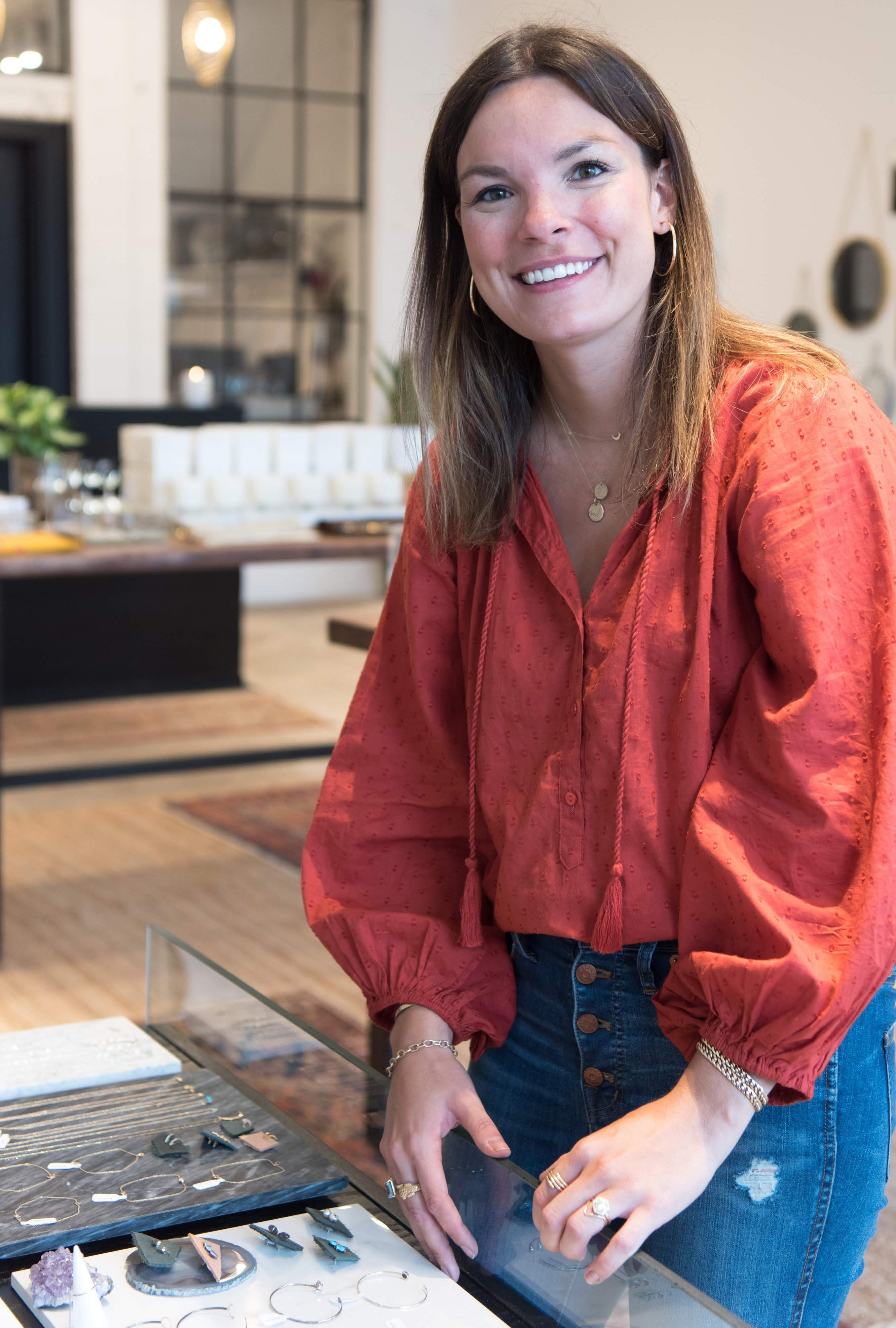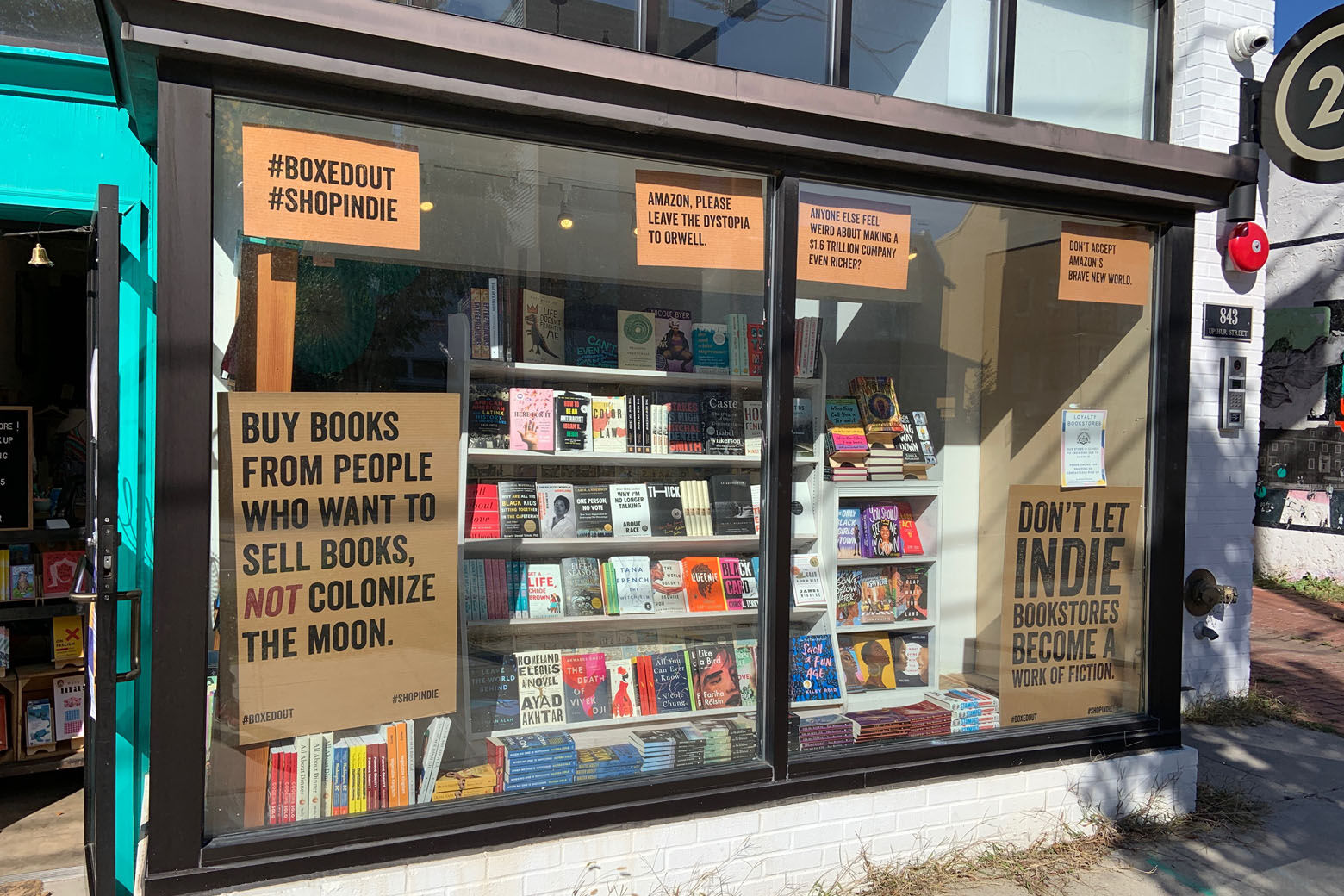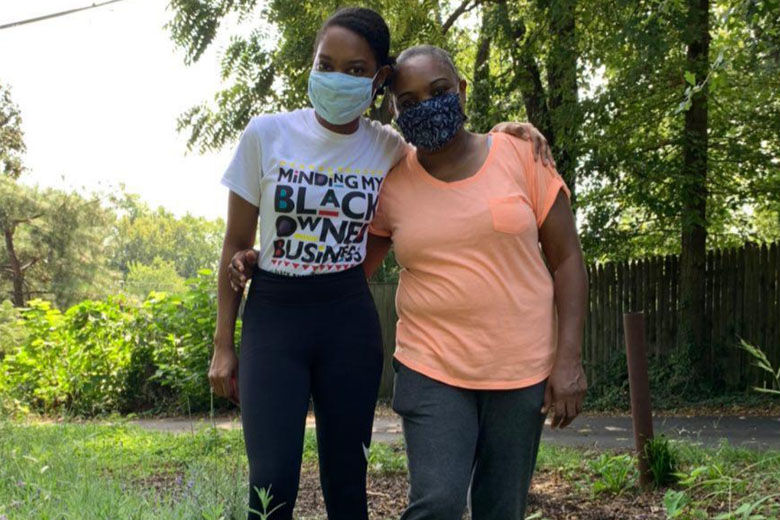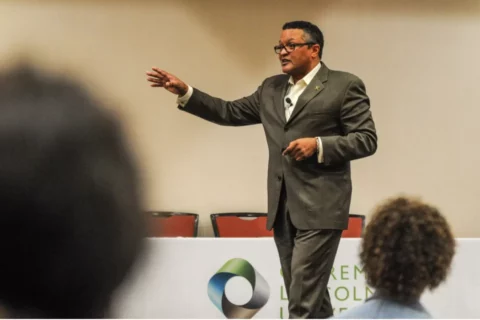For the past decade, Small Business Saturday has been a once-a-year occasion to encourage people to think local amid the rush of the holiday shopping frenzy.
This year, it’s more than just a heartwarming bit of PR. Amid the economic toll taken by the coronavirus, strong sales during the holiday season could be make or break for many small businesses.
“Things like Small Business Saturday are critical every single year,” said Mallory Shelter, a jewelry designer and small business owner and the founder of the DC Shop Small initiative. “That said, this year is certainly imperative. I think this holiday season will be the determining factor if businesses are able to weather the storm.”

The DC Shop Small initiative is partnering with the District Bridges group to prepare for a big virtual shopping event Saturday: More than 300 small businesses across the D.C. area — ranging from retail shops, online artisans, restaurants and fitness studios — are taking part, with the goal of generating at least 20,000 online sales at area small businesses. To encourage buying local, customers who upload receipts of Small Business Saturday purchases from local small businesses will be entered into a raffle for a gift box with $900 worth of goods and services from D.C.-area small businesses.
“It’s really just kind of a way to bring the small business community together and really encourage residents of D.C. and beyond to shop small and support their local businesses this time of year,” Shelter told WTOP.
Shelter founded the DC Shop Small initiative earlier this year and held an online shopping event spotlighting small businesses. It was around the time Shelter was forced to close her storefront location in D.C.’s Union Market for several months because of coronavirus restrictions — and she knew she was far from the only small business hurting.
The event in the spring was a hit. “I had a lot of business owners tell me it was the best sales they’ve ever had,” Shelter said.
She’s hoping for a repeat.
“I think the next couple of months are going to be really critical for making sure that businesses stay alive,” Shelter said, explaining that she typically makes 50% of her total operating revenue in November and December. “January is historically our slowest time of year. Then add on a pandemic … and that’s feeling much scarier.”
In terms of her own business, Shelter’s shop has since reopened but she’s been relying on social media, such as Instagram, to build more of an online customer base to make up for lost foot traffic to her store.
“We’ve pivoted, and I’ve managed to stay afloat for now,” she said. “But, you know, the fear is still very much there.”
A passion for polish
Small business owners across D.C. say the pandemic has upended well-thought-out business plans for 2020.

Kendra Wooldridge, the founder and CEO of Janet & Jo, a D.C.-based online nail lacquer company, was already entirely virtual before the start of the pandemic. But coronavirus restrictions forced the cancellation of the big beauty trade shows she relied on to get her flashy nail polishes with fun — sometimes tongue-in-cheek names — in front of potential customers.
Wooldridge, who has a background in finance, launched her business — named for her two grandmothers — in August 2019.
“I initially started the company just out of my passion for polish,” she said. “And then I pivoted to more of an educational stance once I learned about all the toxins that are in traditional nail polishes.”
Wooldridge said her polishes are what is known as “10-free,” a term used in the beauty community to describe 10 common chemicals found in nail polish.
Wooldridge said the pandemic has affected her business in a number of ways.
“A lot of people are out of work,” she said. “You know, polish, jewelry, things of that nature — it’s a luxury item. It’s not a necessity, like food, or clothing or shelter. So you have to deal with that.”
Still, she’s taking her wins where she can get them. In the spring, when nail salons across the region were shuttered, Woolridge said she saw a sudden influx of customers suddenly forced to do their own manicures at home.
As a small-business owner, Woolridge said she brings a personal touch to her polishes from the selection of vivid colors to the titles and the back stories behind each shade.
There’s “From D.C. with Love,” a cool gray hue, which Woolridge — a Massachusetts native who’s lived in the area since 2005 — calls a “love letter from our favorite big, little city.”
“Alma Mater,” a deep shade of blue, is a tribute to Morgan State University, where Woolridge graduated from, a shoutout to HBCUs everywhere, she said.
Other shades have more personal meaning. A bold red color called “Courage” is a tribute to Wooldridge’s late mother, who battled breast cancer three times and then brain cancer. Red was her favorite color.
“Each time she faced cancer … she was very strong about it,” Woolridge said. “She wore gowns to her chemo appointments, because life is her runway.”
Wooldridge said she hopes small businesses can hang on.
“What I expect to see in a post-COVID world are more chain stores,” Woolridge said. “A lot of mom-and-pops have closed and that takes away from the culture of a city and from an area — that’s what makes each city unique … And so to keep us unique, we have to invest in our communities, which are our local businesses.”
Staying loyal
Loyalty Bookstore, which has locations in D.C.’s Petworth neighborhood and in Silver Spring, Maryland, has faced a roller coaster of a year: The virus forced the store to close its doors during the first round of coronavirus restrictions and lay off staff. Then, amid the wave of protests this summer over racial justice, the bookstore faced a surge of sales from shoppers interested in anti-racist literature.
“Like a lot of businesses, we’ve had to redo the whole business model many times over,” said Christine Bollow, the programs and marketing manager for the bookstore. “You know, it’s been tough, but thankfully, we have an amazing community that’s been really supportive, and with more awareness of shopping and supporting Black-owned businesses, that’s definitely made a difference this year for us.”

As it stands now, the D.C. location is open for contactless pickup and “window shopping,” meaning a store employee can check a title for you if you’re in the neighborhood. The Silver Spring location is open for appointment shopping.
The bookstore is using a number of methods to stay connected with customers, including virtual author readings. Book bundles are also offered as a way to recapture some of the serendipity of browsing a bookstore: You fill out a questionnaire on your reading interests and bookstore staff send a bundle of books sight unseen.
“Everyone knows that the pandemic has been just so tough on small businesses, especially independent bookstores. “A lot have unfortunately, had to close over this year,” Bollow said.
While Loyalty is hanging on, there have been challenges.
For one, it typically takes longer for small independent bookstores to ship books than Amazon’s lightning-fast shipping speeds.
In addition, the entire book industry is facing supply chain issues.
“It does tend to take a little longer to get your books from independent bookstores, but obviously, the money stays in the community,” Bollow said. “It’s directly helping, you know, your community, the people who work there, you know, real people, not an algorithm.”
She added: “We definitely do not want to shame anyone for shopping where they can afford to because we understand that, you know, there’s a lot of financial difficulties … But I think if you have the means, if you can spend your money at an independent bookstore versus Amazon, you know, it makes a difference. It really does.”
If you’ve procrastinated on your holiday shopping, Bollow recommended using Loyalty’s page on Bookshop.org, which provides for faster shipping but still benefits indie book stores. If you’re interested in gifting audio books, she recommended doing so through Libro.fm.
Spicing things up

For Nyana Quashie, half of the mother-daughter team that started Camella’s Kitchen, a small business that makes gourmet sauces and marinades the Small Business Saturday event is crucial to gaining more visibility for their new business.
Quashie went into business with her mother last year. Natives of Trinidad and Tobago, who now live in Prince George’s County, they aim to popularize Caribbean flavors using locally sourced peppers, honey and herbs to make their gourmet sauces and marinades.
Caribbean cuisine is a “very cosmopolitan mix of food,” Quashie said, full of many different influences due to the unique cultural history of Trinidad and Tobago. “There are African influences and Indian influences and even Spanish influences as well,” she said.
Camella’s Kitchen — named for Quashie’s grandmother — sells a variety of pepper sauces as well as snacks, such as seasoned and fried chickpeas, known as a channa, and Caribbean fruitcake.
In-person pop-up events around Maryland accounted for the majority of their business last year when they launched.
“That was our bread and butter,” Quashie said, adding,” “So the pandemic completely blew things up for us.”
The company started posting recipes online and working with local food bloggers to highlight their unique flavors. For example, add a splash of the pumpkin spice pepper sauce from Camella’s Kitchen to spice up — literally — your traditional pumpkin pie recipe.
“We’ve gotten rave reviews from our customers … It’s so spicy, but the flavor is so worth it,” Quashie said.
2020 wasn’t quite how Quashie pictured her second year of business going.
“It’s been quite a journey. I think that we are adjusting, and we are really trying to make it through.”
She added: “I think it’s really important for people to shop small, because, you know, a lot of businesses really are the backbone of the United States. And for us when you shop with us, you’re not just supporting a small business, but you’re supporting a family like ours, and you’re supporting a community and therefore, the local economy as well.”








